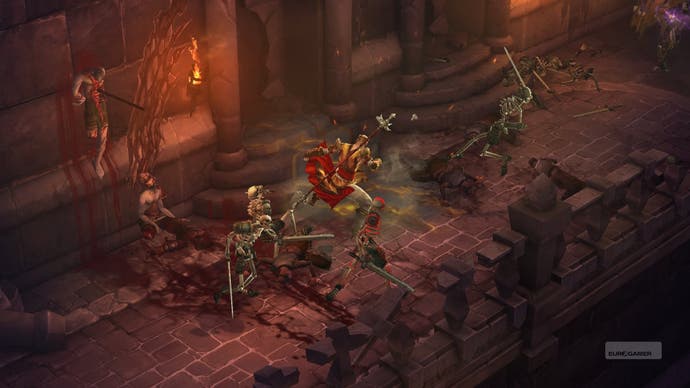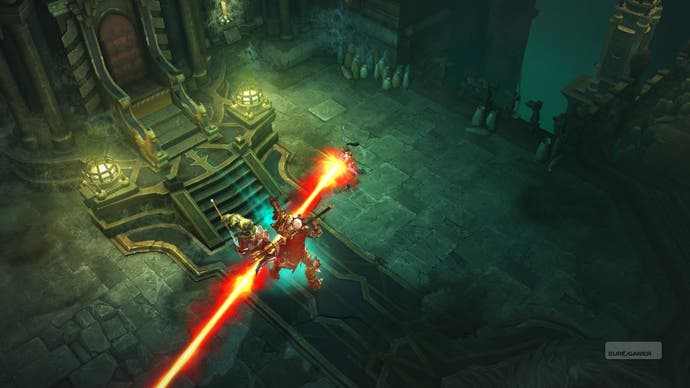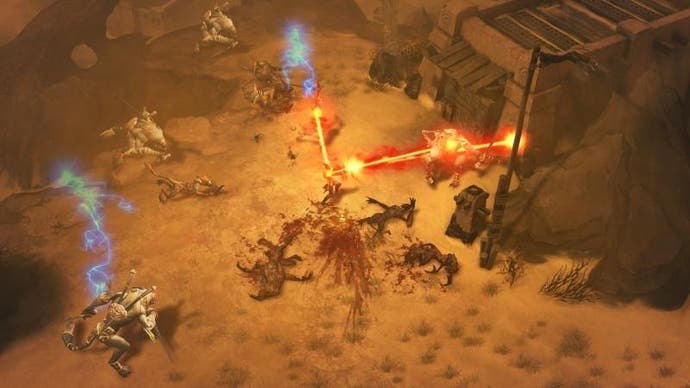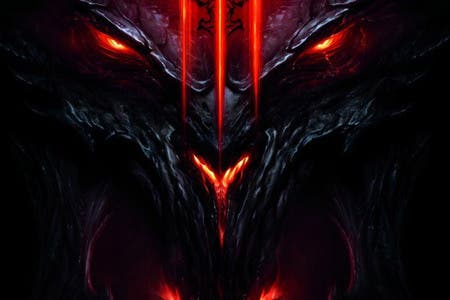Diablo 3 Review
The devil is in the details.
Diablo 3 is an action role-playing game - with the emphasis firmly on action. You'd get that, of course, from the murderous riot on the screen, the boom and splatter from the speakers and the showboating skills of its five astonishing playable heroes. You'd get it from its two predecessors, in which you hand-cranked your characters through near-limitless levelling with furious clicks of the mouse.
The action bias goes deeper yet, though. Game director Jay Wilson and his team have taken big risks, stripping the game's role-playing systems to the bone in a series of pitiless cuts that lasted into the final months of development. Their bosses have taken even bigger risks, requiring an internet connection to play and introducing an auction house that allows players to trade items for real money (which isn't online yet).
The result is an incredible game that finds, in Diablo, the link between two worlds you never thought you'd see reconciled. On the one hand, it channels the senseless thrill of the arcade, reconnecting dungeon-crawling with Atari's 1985 classic Gauntlet as well as the furious spectacle of modern greats like Geometry Wars. On the other, it embraces the customisation, connection, macroeconomics and long, long, long-form progression of massively multiplayer online games - including World of Warcraft, of course, but also more liberal player economies like CCP's Eve Online.

Instant and persistent, with irresistible hooks sunk into opposite extremes of the gameplay spectrum - it's a heady mix. But not every one of Blizzard's gambles has paid off.
Let's deal with that elephant in the room first. The required internet connection was contentious well before it horribly marred the game's launch with login errors and service outages (see '37 Ways to Die', left). Those problems won't last long, but they've vividly exposed the cost to players of a decision made largely for business reasons - to combat piracy and protect the integrity of Blizzard's cash cow, the auction house.
That cost is, quite simply, far too high. The security argument is weak when you consider that online-only games still have significant vulnerabilities - illustrated at time of writing by a spate of account-hacking. The omission of any kind of offline mode, even a completely walled-off one such as StarCraft 2's - which allows you to play the campaign on a guest login, without achievements - is disappointing in the extreme.
I'm much more sympathetic to the game design reasons for the move, which argue that persistence, social features, trading and deep integration of multiplayer co-op (the competitive Arena mode will be added later) make the game much more fun. They unquestionably do. In fact, it's a bitter shame that the poor launch service has obscured what is otherwise a dazzling piece of engineering and design - a true vision of the future of connected gaming that for seamlessness, approachability and ease-of-use knocks every rival on computers and consoles into a cocked hat. In those terms, Diablo 3 is one of the best online games ever made.

I've already detailed its virtues (and a few niggles) but the stellar implementation of drop-in, drop-out co-op needs to be singled out here. The elegance and speed with which you can jump between friends' games, public games and private games, dotting around the levels, cycling through various sessions and modes of play according to your mood, with the game dynamically adjusting difficulty to party size - all without breaking the action for more than 30 seconds at a time - is quietly breathtaking. This is what co-op gaming is supposed to be like. You'll never look back.
Admittedly, the game's team dynamics aren't the most sophisticated, but that just makes it easier to enjoy in any and all company. Diablo 3 is just as fun solo - but, even then, the sense of belonging to a universe of players gives you that MMO frisson with none of the laboriousness or scary investment. Diablo 3 ought to act as proof that single-player adventuring and modern social gaming can live in harmony. Thanks to the always-online requirement, it's acting as the exact opposite.
At the other end of the endeavour, we have Wilson's efforts to pare down and modernise the classic action-RPG. Happily, this is no double-edged sword. Diablo 3's light RPG framework fixes broken systems, annihilates clutter, vastly improves balance, beefs up the action and offers players a very different kind of freedom. It's intoxicating.
It's founded in the five hero classes. Each of them is surprisingly multi-faceted and gloriously potent; each of them is a masterpiece. The charms of some are more obvious than others. The thundering Barbarian, a durable dervish who slams and cleaves through the scrum, delivers primal gratification from somewhere deep in your gut. The imperious Wizard is a one-woman light show, the 'glass cannon' concept in excelsis.
The three others are more original. The Monk is a martial artist that seems stolid at first before you link his skills together into a rhythmic tattoo of risk and reward, balancing violence and healing on a knife-edge. The Witch Doctor is a bizarre hybrid whose creepy menagerie of summons and suite of debuffs, status effects and delayed damage affords a more detached play style. The Demon Hunter is the ranger envisaged as a shadowy mobile weapons platform, with peerless positional control of the battlefield.
"It's a bitter shame that the poor launch service has obscured what is otherwise a dazzling piece of engineering and design - a true vision of the future of connected gaming."
Progression is straightforward. Character attributes are extremely basic and handled automatically. There are no skill trees, with skills unlocking at each level in a set pattern. The runes that modify your skills with effects (sometimes changing them entirely) are also simple level unlocks. Skills are categorised into six types - builders, spenders, defensive and so on - with each type locked to a slot on your skill bar to encourage you to keep a balanced suite. (More creative character builders will want to circumvent this with Elective Mode - if they can find the well-hidden option to do so.)
It sounds dumbed down, and I suppose it is. But there is a blissful pay-off: you have freedom to swap your skills and runes around with no penalty other than a short cooldown, encouraging constant experimentation and customisation across a remarkable variety of play styles. There's no choice you can't undo, while the number-crunching optimisation of traditional role-playing character development is entirely sidelined into the item game.
It's so liberating. Wilson has rejected out of hand the idea that consequence is what makes choice interesting - and with it binned that remorseless and crude logic by which more is always better, endemic to RPGs and the previous Diablo games in particular. Instead, he's let the character-building process breathe, focusing it entirely on the creative impulse and a joyous expression of what feels fun to play.
It wouldn't work so well if the skills and runes themselves weren't sensational, delivering a feeling of unbridled, barely controllable power through their varied design and some explosive visual and audio effects. The term 'toybox' doesn't do justice to this head-spinning buffet of carnage.
Through these skills, thoughtful monster design and a revised health system, the action moves away from the mindless spam of vintage Diablo to a more tactical and sophisticated style where positioning is always key and genuine risk comes with real reward. Putting the balance-breaking health potions on cooldown and introducing health drops - which are often left in dangerous spots and, in a neat touch, heal your whole party - is a particular masterstroke.
You might not clock the combat depth straight away, however, because the initial Normal difficulty is a casual cakewalk that only escalates in intensity, overwhelming you with large numbers of heavy-hitting enemies. It's only after you complete the 20-hour (give or take) campaign that the real Diablo 3 reveals itself; you can then take the same character on through Nightmare, Hell and Inferno modes, where monsters are tougher and have new skills.
There's deep reward to be had here, but not a sudden jump in challenge. If anything, the difficulty curve is too smooth, too managed, too reluctant to deliver that stinging slap to your senses. The biggest casualty is loot. Although it's never less than compulsive fun to hoover up Diablo's fountains of shinies and admire the increasing extravagance of your costume, it all seems a bit inconsequential until you're deep into the game. Even then, it's clear that the skills are the real treasure this game holds.

What treasure, though. And what a ride. Diablo 3's plot is total nonsense, a string of risible MacGuffin hunts that are barely explained by the hokey dialogue. But it's eventful, entertaining and stuffed with colourful characters like the ghost of mad mage Zoltan Kulle, or the pot-bellied demon lord Azmodan (whose voice will break your subwoofer) - all summoned by a spirited voice cast who deliver every ridiculous line as if it were their last.
It's gruesome when it wants to be, but also has a vigorous, pulpy, matinee feel that has more to do with Star Wars and horror comics than real dark fantasy. Meanwhile, Blizzard's artists transport you from Gothic despair to Arabesque intrigue to frozen siege and beyond (really beyond) with all the eloquence and finesse the script can't muster.
You can ignore the story if you want, and you probably will as you play through it again and again and again - trying out the superior higher difficulties, or the brilliant heroes, or the high-tension Hardcore mode in which character death is permanent and an initially casual game suddenly becomes a frighteningly intense one. The randomised maps, complete with mix-and-match events that differ on each play-through, keep things fresh. But it's those classes and skills that are Diablo 3's real content - and they're so well conceived and fun to play with that you'll probably still be clicking months after you first see the ending. I know I will.
Diablo 3 is more than slick, and more than deep. It's a turbo-charged romp through the conventions of action, role-playing and online games that plays to the gallery but tears up the rulebook on the sly. It has been awfully compromised by its launch and by the lack of an offline mode, but it deserves better than to be remembered for that. And I'm certain it won't be.

